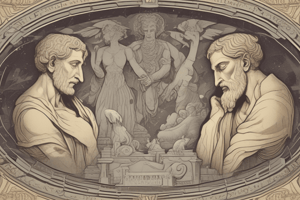Podcast
Questions and Answers
Who is considered the father of psychology?
Who is considered the father of psychology?
- Hippocrates
- Rudolf Gockel
- Aristotle (correct)
- Democritus
St. Augustine of Hippo introduced the method of introspection.
St. Augustine of Hippo introduced the method of introspection.
True (A)
What does the term 'tabula rasa' refer to?
What does the term 'tabula rasa' refer to?
blank slate
Which psychologist is associated with classical conditioning?
Which psychologist is associated with classical conditioning?
The father of modern psychology is ______.
The father of modern psychology is ______.
Who proposed that psychology should be treated as a natural science?
Who proposed that psychology should be treated as a natural science?
Match the following psychologists with their contributions:
Match the following psychologists with their contributions:
What does the law of effect state?
What does the law of effect state?
Hippocrates was the first to theorize that mental disorders come from natural causes.
Hippocrates was the first to theorize that mental disorders come from natural causes.
Study Notes
Psychogenesis of Psychology
Ancient Period
- Animism: Belief in Gods and spirits as direct causes of events.
Greek Period
- Democritus: Proposed the mind is made up of atoms interacting with the brain.
- Plato: Viewed the soul as distinct and divine, comprising three elements of the psyche:
- Reason: Head
- Spirited Element: Heart
- Bodily Appetites and Desires: Diaphragm
- Aristotle: Considered the father of psychology, author of "De anima" focused on the soul's three functions:
- Vegetative: Basic maintenance
- Appetitive: Desires and motives
- Rational: Reasoning
- Hippocrates: Suggested mental disorders have natural causes, founding principles of modern medicine.
- Galen: Linked temperament to physiological factors:
- Sanguine (cheerful)
- Phlegmatic (sluggish)
- Melancholic (sad)
- Choleric (irritable)
Medieval Period
- St. Augustine of Hippo: Integrated Christian thought with introspection.
- St. Thomas of Aquinas: Merged Aristotle’s ideas with Christian doctrines on the mind and immortality.
Pre-Modern Period
- Rudolf Gockel: Coined the term "psychology," meaning the study of the soul.
- Francis Bacon: Advocated for psychology as a separate scientific discipline.
- Rene Descartes: Introduced dualism; emphasized mind-body interaction.
- Thomas Hobbes: Conceptualized humans as physical mechanisms.
- John Locke: Proposed the mind as a blank slate (tabula rasa).
- George Berkeley: Established "theory of knowledge," where ideas are the essence of reality.
- Christian Von Wolff: Differentiated between ontology (study of being) and metaphysics (study of existence and reality).
- David Hume: Clarified the distinctions between impressions (raw data) and ideas (creative interpretations).
- Franz Aton Mesmer: Explored "animal magnetism" in treating hysteria.
- Immanuel Kant: Argued the mind is not a blank slate, emphasizing sensory experience.
- Johann Friedrich Herbart: Established psychology as a scientific field.
- Ernst Weber: Suggested ideas must be stimulated to evoke sensation.
- Hermann Von Helmholtz: Developed theories on color vision.
- Charles Darwin: Introduced evolution and natural selection concepts.
- Gustav Fechner: Examined the mind-body connection.
- Paul Broca: Identified "Broca's area" related to speech fluency.
- Francis Galton: Pioneered behavioral genetics and the study of human differences.
Modern Psychology
- Wilhelm Wundt: Founded the first psychological laboratory in Leipzig, known as the father of scientific psychology.
- William James: Established American psychology, author of "Principles of Psychology."
- Emil Kraepelin: Recognized as the father of modern psychiatry; described bipolar disorder.
- Edward Titchener: Developed structuralism, the analysis of the mind’s basic components.
Contemporary Psychology
- Sigmund Freud: Developed psychoanalysis, focusing on the unconscious and free association methods.
- Carl Jung: Proposed theories on neurosis, analytic psychology, and the collective unconscious.
- Alfred Adler: Emphasized the significance of feelings of superiority and inferiority.
- Karen Horney: Developed the theory of the basic need for love and security.
- Karl Pearson: Pioneered statistical analysis of behavior, including correlation and chi-squared statistics.
- Charles Spearman: Established classical test theory and factor analysis.
- Alfred Binet & Théodore Simon: Created the Binet-Simon scale for intelligence assessment.
- Ivan Pavlov: Discovered classical conditioning through the famous dog experiment.
- William McDougall: Promoted hormic psychology, focusing on innate drives.
- Edward Thorndike: Known as the father of educational psychology; introduced the law of effect.
- B.F. Skinner: Developed operant conditioning, distinguishing types of reinforcement and punishment:
- Positive Punishment: Adding an unpleasant outcome (e.g., spanking).
- Positive Reinforcement: Adding a desirable outcome (e.g., bonus for good work).
- Negative Punishment: Removing a pleasant stimulus (e.g., taking away a phone).
- Negative Reinforcement: Removing an unpleasant stimulus (e.g., getting out of bed to avoid a noise).
Studying That Suits You
Use AI to generate personalized quizzes and flashcards to suit your learning preferences.
Description
Explore the psychogenesis of psychology from the ancient period through the lens of animism, Greek philosophers like Democritus, Plato, and Aristotle. Understand how these early thoughts shaped the foundations of psychological theory and the human psyche. Test your knowledge on how these ideas contribute to modern psychology.




